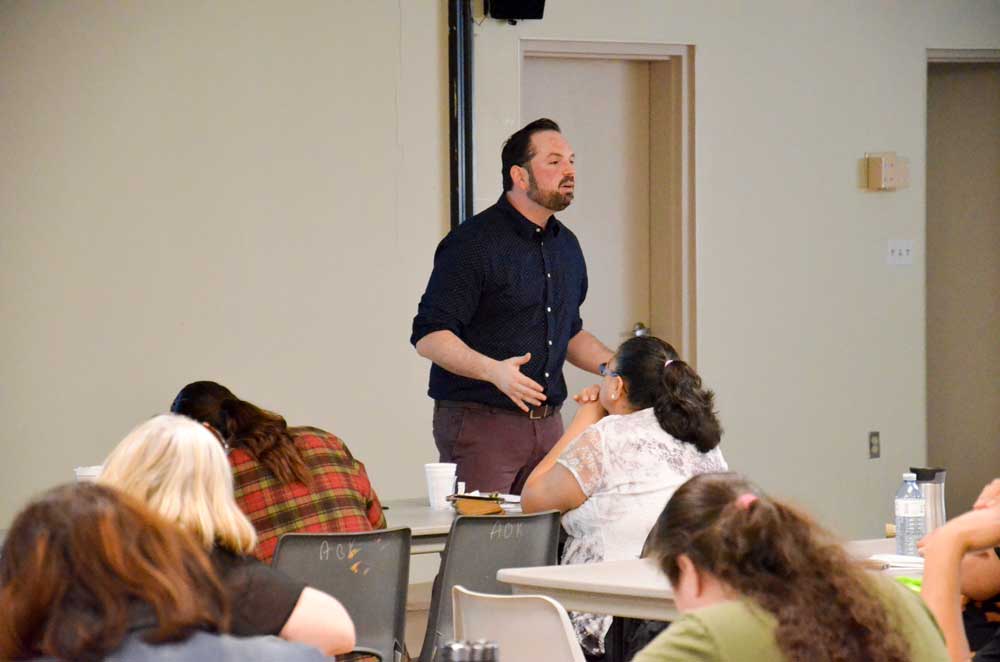AUNDECK OMNI KANING—Creating strong families requires the construction of solid foundations and a recent Noojmowin Teg Health Centre workshop on FASD (Fetal Alcohol Spectrum Disorder) and child nutrition sought to provide caregivers and front line workers with the tools necessary to build a solid base.
“The workshops were open to all,” said organizer Melanie Francis, Noojmowin Teg Health Centre’s New Beginnings FASD Coordinator. “We were targeting frontline workers, teachers, parents, enforcement services and caregivers, but it was wide open for anyone to attend because this is information that is useful for a wide range of people.”
The workshop was a collaboration between the Better Beginnings program and Noojmowin Teg’s child nutrition program and funded through the Ontario Ministry of Children and Youth Services.
FASD helper, leader and innovator Jeff Noble, one of two presenters at the workshop, has harnessed the power of social media to deliver information that is relevant, useful and “need to know” to assist frontline workers, educators and caregivers of those living with someone living with the challenges of FASD. He speaks from a solid base of science and education, but also from the heart, he has an adopted child with FASD.
Mr. Noble has designed college certificate programs and written books on the subject of FASD and its aspects including ‘Making Sense of the Madness: An FASD Survival Guide’ and ‘FASD Soundbites and Sanity Savers.’ His presentation sought to take a lot of the mystery out of the what lies behind FASD “behaviours” and to push back against the stigma that comes with being the parent of a child with FASD.
“The biggest problem is not so much the kids, but the stigma that comes with being the parent,” he said. “They have to deal with being labelled helicopter parents.” Dealing with FASD takes a tremendous amount of focus, but people don’t see the injury that necessitates that focus. “People don’t understand because the child looks normal, talks normal, but acts disabled.”
It used to be thought that FASD was written on the face, with distinctive features heralding the condition, but that has long been debunked. “They now know that 94 percent exhibit no facial features,” explained Mr. Noble. “They have now changed the Ontario diagnostic guidelines.”
The primary characteristics of FASD are poor decision making. Small wonder, as FASD’s main impacts exhibit in deficits in executive function.
The invisibility of FASD, and to some extent the stigma attached to the condition, have conspired to mask the extent of the problem.
“There are so many people,” said Mr. Noble. “A recent study conducted by the National Institute of Mental Health in the US surveyed 6,000 Grade 1s in four different regions. They found 222 under the American guidelines, only two had been previously identified. Now they are saying one in 20. It is at least as prevalent as autism.”
As to the stigma attached to mothers consuming alcohol during pregnancy, it is long past time that was set aside. “When you consider that at least 50 percent of pregnancies are unplanned it is time we stop pointing fingers,” said Mr. Noble. “People didn’t know.” In fact, given the long history of bad science (think the old canard of the impact of beer on lactation etc.) a huge number of people still don’t know.
Dealing with the behavioural aspects of FASD can bring with it a great deal of stress, but understanding that the source is not behavioural as such, but rather stems from how FASD impacts the brain—that impairment of executive function.
“The main message of that part of the workshop was ‘think brain, not behaviour’,” said Ms. Francis. “FASD is an invisible brain injury and instead of focussing on the behaviour we should realize that the child is dealing with a brain abnormality and not doing it deliberately.”
“The difference between behaviour and brain is that behaviour implies a wilful act,” said Mr. Noble. But when it is a deficit in executive function, that doesn’t apply. “That is why someone with FASD makes the same mistakes over and over again, no matter what the sanctions are. When it is behaviour we greet it with punishment, when it is a physical dysfunction we meet it with support.”
But in reality, despite its wide dispersion and social impact we are ill-equipped to deal with FASD. “We end up driving them crazy because of our expectations,” said Mr. Noble. “They wind up so frustrated.”
FASD knows no boundaries either. This isn’t a situation where one community or group of people share the impact. “Alcohol knows no boundaries, no race, colour or religion,” said Mr. Noble. “It is present everywhere. I have travelled all over the world and I can tell you, it is everywhere. It doesn’t discriminate.”
FASD is difficult to deal with, noted Ms. Francis. Not only does it take more than a year, sometimes as much as two years, to get a diagnosis of the disorder, even when you have that diagnosis in hand there is little in the way of supports out there for caregivers.
“People think that diagnosis will open doors to support, but when they get there they discover that there are little to none available,” said Mr. Noble. “The Ontario government has recently pledged $25 million to open centres. We will see how that pans out. But despite that, we have a long way to go.”
Mr. Noble is doing his bit to offset that dearth.
“There isn’t a direct link to particular foods to help deal with FASD,” noted Cody Leeson, Noojmowin Teg child nutritionist, “but having a sound nutritional basis can help build stronger families that are better able to deal with challenges.”
Educator Neil Debassige, currently on educational leave from his position as principal at M’Chigeeng’s Lakeview School but wearing his host of the outdoor adventure program Fuel the Fire hat for this occasion, encouraged attendees to get outdoors and discover the value of the outdoors in creating quality family time. The motto of Fuel the Fire dovetailed neatly with the theme of the presentation, noted Mr. Debassige. “The message from Fuel the Fire TV is about learning how to appreciate what the outdoors has to offer us in terms of learning about ourselves, the environment, our relationships and about the value of time. There is no better classroom than the outdoors and we want to share our passion with our viewers. Fuel your passion, fuel the fire and get outdoors.”
Mr. Debassige said to that end “I came at it from a number of different angles. When you look at nutrition in foods, there are a number of benefits to the outdoor lifestyle and wild, free roaming foods.”
The secret is in “keeping in balance,” said Mr. Debassige, who noted that balance for Indigenous peoples centres on the teachings of the medicine wheel.
“It was good,” said Mr. Debassige of the reaction his talk received by the workshop participants. “We had a good conversation about the global food crisis and the industrialization of food. The high input system that is currently in place is unsustainable.”
Mr. Debassige referenced the book ‘The Omnivore’s Dilemma’ in his presentation, a seminal examination of the domination of the modern food chain by corn and oil.
“We also looked at the nutritional content of foods, Canadian beef vs moose and the caloric values,” he said. But it wasn’t all focussed on the negative. “We discussed ways we can improve things,” said Mr. Debassige.
A couple of examples of that was the idea of just making two healthy food choices in the day. “Starting small,” he said. “Instead of a carb-based snack, choosing a protein-based one, or instead of grabbing a bag of chips, reaching for an apple, instead of ice cream trying out some frozen grapes and celebrating when we make better choices.” Making better choices can induce a self-sustaining cycle, even when starting out small.




